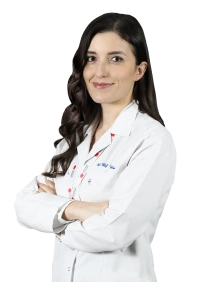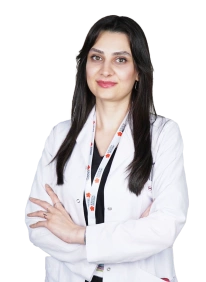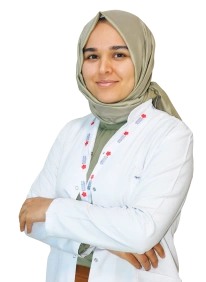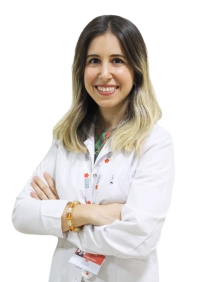Nutrition and Dietetic
Healthy Nutrition and Diet with Personalized Programs
Nutrition is to consume sufficient amounts of nutrients that the body needs in order to protect and develop health and improve the quality of life.
In our nutrition and dietetics department, personalized comprehensive diet programs and nutrition services are offered to our patients. In addition, our expert dietitians provide services on nutrition programs suitable for diseases, nutrition in childhood, weight loss and weight gain.
Nutrition and diet programs suitable for their physical and personal characteristics are prepared for our patients who apply to our department, and support is provided to reach the targeted ideal weight.
Special diet programs are organized for our patients who are treated in our inpatient services, when deemed necessary and regular planning of their menus and training about their diets are provided during their hospitalization.
Weight Control Programs
Nutrition in Childhood
|
Proper nutrition is very important for children. Because it determines both the healthy development of the child and the eating habits in the future. The effects of a healthy diet in these ages are seen throughout life. We can divide childhood nutrition into preschool and school age. Due to the rapid growth and development in the pre-school period, more various nutrients are needed compared to other periods of life. Since the school age is a period when they are very active physically and mentally, it is necessary to pay attention to a healthy diet. Considering all these, healthy and correct nutrition education should be given to children at this age. |
Nutrition During Adolescence
|
Since physical characteristics are very important during adolescence, children pay more attention to look fit and slim. If they are not guided correctly, they can disrupt their eating routines by acting on hearsay information to look beautiful. When such a tendency is noticed in children, you can consult a nutrition and diet specialist and have a diet list prepared according to age. |
Pregnant - Breastfeeding Nutrition
|
Individual nutritional recommendations can also be made for pregnant women, those who want to become pregnant, and women who are breastfeeding. The most important point to be considered while preparing a diet list during pregnancy is that the diet does not prevent the healthy development of the baby. In addition, another purpose here is to prevent the expectant mother from gaining excessive weight. |
Nutrition at Advanced Age
|
When people aged 65 and over do not pay attention to proper nutrition, the body becomes more susceptible to various diseases. One of the causes of diabetes, cardiovascular diseases, osteoporosis, stroke, skeletal and muscular system diseases is due to inadequate nutritional habits. |
Sports Nutrition
|
Since athletes exercise regularly, it is very important to pay attention to their nutrition. The sports, regardless of walking, pilates or fitness, need to be supported by a healthy diet. The athlete's diet includes the type, timing, and amount of fluids and macronutrients ingested. In addition, it is determined how much and how often the vitamin, mineral and supplementary support should be used in this diet type. Since the nutritional elements and energy needs to be taken will be different according to the sport, a diet list should be prepared accordingly. |
Weight Gain
|
It is generally referred to nutrition and diet experts for healthy weight loss. However, some people are also extremely thin and want to gain weight and be healthier. Because being slim doesn't always mean being healthy. The body mass index of people who apply to gain weight should be checked and a nutrition program should be prepared in order to reach their ideal weight.While consuming more calories than the average daily calorie intake causes weight gain, if it is below this amount, weight loss occurs. |
Therapeutic Nutrition
-
Obesity Treatment
Obesity is an increasing disease in the world. This disease can not only cause physical problems, but also cause chronic diseases and metabolic problems.
The aim of obesity treatment is to reduce the risks of morbidity and mortality, and to provide individuals with balanced and healthy eating habits. For a faster and more controlled weight loss in the obesity treatment, diet and exercise should be performed together. For permanent weight loss, attention should be paid to the food portions after the treatment.
-
Nutrition in Diabetes
With a personalized nutrition program, a healthier and higher quality lifestyle can be created for patients with diabetes. Especially in type 2 diabetes, with a good nutrition plan, blood sugar can be kept at normal levels, while at the same time it is possible to prevent hyperglycemia and hypoglycemia, to have and maintain ideal body weight.
There is no single diet list applicable to all diabetic patients. The diet varies depending on the patient and the disease progression. However, it is important to keep the balance of proteins, carbohydrates and fats in the body.
-
Nutrition in Cardiovascular Diseases
Apart from genetic factors, diet is also effective in cardiovascular diseases, which are very common in our country and in the world. Unhealthy and irregular eating habits can lead to the progression of these diseases. If the Mediterranean diet type is followed, the risk of catching these diseases is reduced and cardiovascular health is preserved.
* Mediterranean diet is a diet that suggests consuming plenty of fruits and vegetables, grains, legumes, nuts, high fiber, moderate amounts of fish and chicken, low red meat, rich in olive oil and low in saturated fats.
-
Nutrition After Bariatric Surgery
One of the biggest mistakes patients do after bariatric surgery is that they do not follow their nutrition program carefully. But after the surgery, dietary habits and lifestyle changes are essential for permanent weight loss.
In our hospital, a personalized diet program is prepared by our expert dietitians for patients who have undergone obesity surgery to maintain the weight they have achieved. As long as the patients follow this program, they will not have any problems related to gaining weight again.
Other counseling services provided for therapeutic purposes in our nutrition and diet department can be listed as follows:
- Nutrition in gout
- Nutrition in blood pressure
- Nutrition in thyroid diseases
- Nutrition in kidney diseases
- Polycystic Ovary Syndrome and nutrition
- Nutrition in the use of anticoagulants (blood thinners)
- Nutrition in menopause
- Nutrition in the digestive system diseases
- Metabolic syndrome and nutrition
- Healthy diet
Nutrition in Special Diets
-
Nutrition in Celiac Disease
Celiac disease is one of the most common food intolerances. This disease is of genetic origin and occurs when a protein called gluten is consumed which is included in grains such as wheat, barley and rye.
Celiac can be seen at any age and in both sexes. Patients should pay attention to gluten-free diet, which is the most effective treatment method throughout their life. Only in this way can the body return to its normal, healthy state.
-
Vegetarian Nutrition
A vegetarian diet replaces meat products (including animal meats such as poultry and fish) with plant foods such as grains, vegetables, soy, legumes, and fruit. When a vegetarian diet is planned and implemented in a careful and disciplined way, it does not have negative effects on health.
A vegan diet, on the other hand, means refusing to use all foods of animal origin besides meat products in addition to vegetarianism. In other words, by-products such as milk, eggs and honey are not consumed in the diet; instead, soy, vegetables, legumes, lentils, fruits, cereals, nuts and mushrooms are preferred.
FREQUENTLY ASKED QUESTIONS
What are the Negative Consequences of Malnutrition and Diet?
|
How to Make the Right Diet?
|
Healthy eating is one of most popular topics in the traditional and social media. Therefore, even the people who are not nutritionists make suggestions about easy diet or shock diet and mislead people. However, permanent weight loss is not possible unless you change your eating habits. Dieters should pay attention to this misleading information and follow their diet lists prepared by the dietitians. |
Can You Make Diet During Pregnancy?
|
Weight gain is inevitable with pregnancy. However, it must be avoided to gain unnecessary weight. For the baby’s healthy development, it is considered normal to gain weights up to 9-12 kg. In multiple pregnancies, this can reach up to 22 kilograms. Weight gain above these figures will also make it difficult to return to the old state after giving birth. If the expectant mother is overweight before pregnancy, she can follow a carefully prepared diet list and make diet without harming both her and the baby's health. |
What is Shock Diet? What are the Harms of Shock Diet?
|
Shock diet is a type of diet that lasts for a minimum of 3 days and a maximum of 7 days. You can get quick results with this diet, but it has many side effects. Sudden weight loss is also a dangerous situation. We can list the negative impacts of these diets on the body as follows:
|
What are the Tips for Losing Weight?
|
For more information and to make a dietitian appointment, you can call our call center at 0850 222 04 94.



















